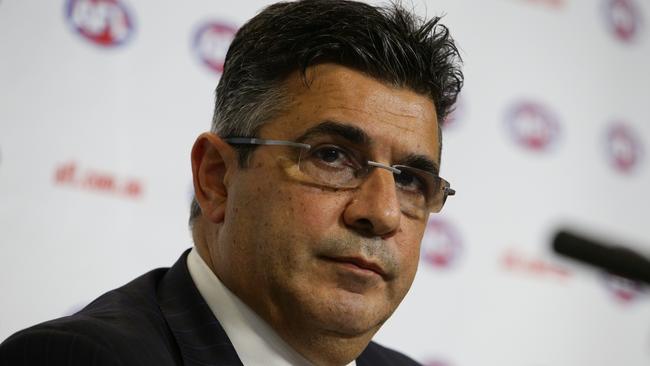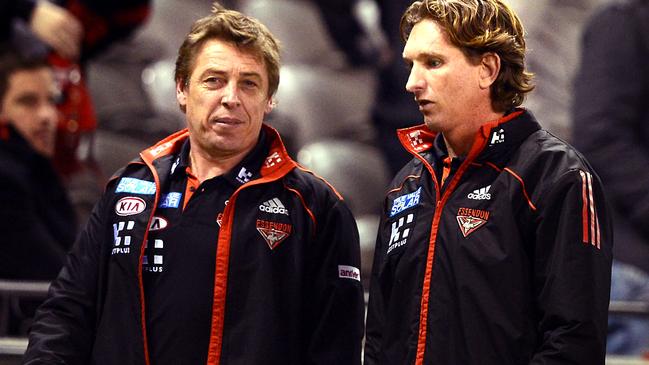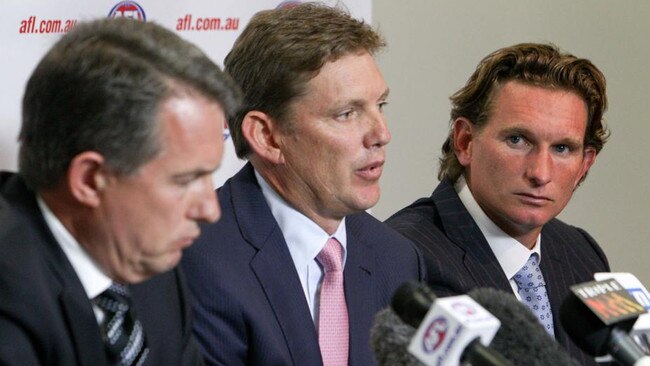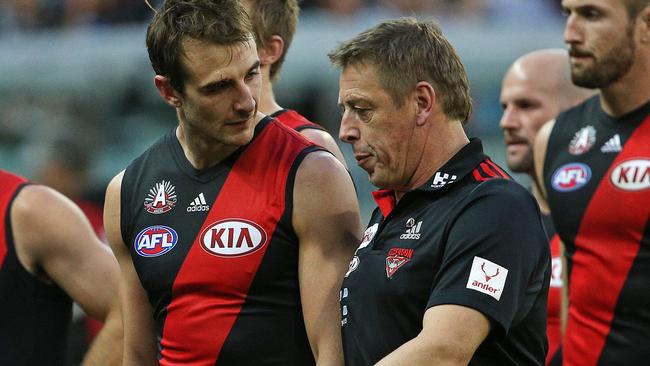Mark ‘Bomber’ Thompson says Essendon’s top brass knew about Essendon supplements scandal
In his most candid interview on footy’s greatest saga, Mark Thompson has expressed his desire to reach out to Jobe Watson and what he would say after he became the face of the scandal.
Essendon
Don't miss out on the headlines from Essendon. Followed categories will be added to My News.
Essendon’s disastrous 2012 injections program was “unethical” and the club’s top brass behaved shamefully in claiming they didn’t know about it, Mark “Bomber” Thompson says.
In his most candid interview yet on footy’s greatest saga, Thompson concedes indefensible mistakes were made at Essendon and says he wishes he had done more to put an end to the supplements regime.
Thompson also scoffs at suggestions Bombers chairman David Evans and chief executive Ian Robson didn’t know what was going on at Windy Hill.
“They probably didn’t know the intricacies of the program, but they knew the program - they were paying for it, for God’s sake,” Thompson says.
READ ABOUT BOMBER’S BIGGEST REGRET
Pressed on his regrets over the saga that saw 34 Bombers players rubbed out for doping, Thompson says: “If I had my time again, I probably knew the whole thing was wrong. I knew that it wasn’t being run properly.
“I was probably derelict in my duties not to say something more. I just put the cue in the rack a bit, you know. I made sure we weren’t doing anything illegal but we were doing something unethical.”
THE BOMBER INTERVIEWS:
The Bomber interviews: How I reclaimed my life after years of torment and dark days
Mark Thompson reveals depths of despair during drug battle and how he has found happiness again
But questions still linger over the joint AFL-Australian Sports Anti-Doping Authority investigation, the subsequent court and tribunal hearings and the penalties.
Asked about how he thought the AFL had handled the saga, Thompson said there should have been more focus on the people and less on the brand.
“When (Andrew) Demetriou started that was when the AFL stopped listening and talking to clubs and coaches,” he says.
“Instead it was just going in and being talked to. ‘This is the way it’s going to be and you’re going to do it’. And I thought from that moment on there was no input from any clubs.”

Of Gillon McLachlan, a central figure in the drugs saga, Thompson says: “I didn’t think he handled the supplements program well. He tried to steer it. Direct it. So that the game never took a great hit on their image. But it wasn’t about the game, it was about people. And I thought the way he treated people was pretty poor.”
He also expresses his desire to one day reach out to Jobe Watson, who lost his 2012 Brownlow because of the program, saying: “All he’s done was tell the truth. And he knows he never cheated ... Jobe is a greatman and he thoroughly deserved his Brownlow.
“I haven’t spoken to him. I’d love to speak to Jobe anytime.
“He lost his Brownlow and became the face of it. It was devastating. He got charged with the biggest crime, mate
Thompson says the Essendon players were let down by Evans.
“I didn’t really think he helped the situation by conceding and taking the side of the AFL,” he says of the ex-Bombers chairman, who has never spoken publicly about those crucial early days in February 2013.
“I thought that the players and their wives and girlfriends and family deserved their club to stand up and fight for them.


“They didn’t expect to have their club, their employers, to be in bed with the sport, who were in bed with the government department.”
But Thompson says his days of obsessing over the greatest scandal in Australian sports history are over.
He has laid down his guns in his fight to expose the truth but he will never forget the shady backroom role played by senior AFL figures.
And he is convinced that the true story of the debacle and all of its behind-the-scenes interference will one day come to light.
Essendon mysteriously “self-reported” to the AFL on Tuesday, February 5, 2013 just days before the “Blackest Day in Sport” press conference in Canberra.
The majority of the 2012 Bombers’ squad were later banned after the Court of Arbitration for Sport concluded they had been repeatedly injected with the WADA “prohibited” substance Thymosin Beta-4.

No positive tests were ever recorded, instead ASADA and WADA mounted a circumstantial case linking the Thymosin-Beta-4 allegedly used at Windy Hill to a peptide factory in China.
The Herald Sun revealed last year that Thymosin Beta-4 was only added to the ASADA “Check Your Substances” website on the afternoon of February 4, 2013 — the day before the Bombers “self-reported”.
The players’ defence team did not know about the log when they were found guilty in January 2016.
In a poll of more than 12,000 Herald Sun readers, 81 per cent said there should have been a Royal Commission into the handling of the doping scandal.
Responding to the emergence of the ASADA logs obtained under Freedom of Information laws, Jobe Watson tweeted: “As I say to my bulldog Benson, if it smells, keep digging.”
While coach James Hird, football boss Danny Corcoran and Thompson were punished over the supplements program, no other club official was sanctioned by the AFL.
A secret internal review of the club’s 2012 drugs program by Dr Ziggy Switkowski found nobody was ultimately responsible, however Robson came in for acute criticism.
The club’s current chief executive, Xavier Campbell, along with Melbourne coach Simon Goodwin (a then Essendon assistant coach) were among those who admitted to ASADA they had used substances provided by sports scientist Stephen Dank.
Originally published as Mark ‘Bomber’ Thompson says Essendon’s top brass knew about Essendon supplements scandal
